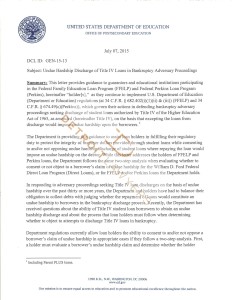Discharging Student Loans in Bankruptcy
The Department of Education has just released a letter indicating how it will handle a bankruptcy filing that attempts to be discharging student loans. Although there are no set rules and the practice has not been developed yet, the letter provides a road map for when an attorney should attempt to discharge student loans in bankruptcy.
Costs To Litigate Considered
In order to discharge student loans in a bankruptcy, the attorney must file an adversary proceeding prior to discharging student loans. In the adversary, attorney must allege that requiring repayment on the student loan will result in an undue hardship against the Debtor. Once the complaint is filed, the Department of Education must make a decision whether to contest the attempt at discharging the student loans. This is where the Department’s letter is important. The letter indicated that if the costs to pursue the matter in bankruptcy court exceed one-third of the total amount owed on the load (included interest and collection costs), then the loan company may accept and not oppose the undue hardship claim.
Undue Hardship Factors
The Letter also listed a number of factors to be considered by lenders whether to contest a student loan discharge. The following factors are:
- Whether a debtor has filed for bankruptcy due to factors beyond his or her control and the impact such factor(s) have on debtor’s ability to repay the student loan debt. Which includesa divorce resulting in diminution of family income, which will not realistically be reestablished.
- Whether a debtor who asserts undue hardship due to physical or mental impairment may qualify for Total and Permanent Disability Discharge (TPD) and/or other administrative discharges available. These include: Death Discharge Closed School Discharge False Certification Discharge False Certification Ability to Benefit Unauthorized Signature or Identity Theft Unpaid Refund Discharge Borrower Defense
- Veterans who have been determined by the Department of Veterans Affairs to be unemployable due to a service-connected disability.
- Whether a debtor is approaching retirement, taking into consideration debtor’s age at the time student loans were incurred, and resources likely to be available to the debtor in retirement to repay the student loan debt. Borrowers who choose to incur student loan debt at an older age, whether that debt is for themselves or a dependent (i.e,, Parent PLUS loans), should not be able to rely on their age alone and/or their entrance into retirement to prove undue hardship.
- Whether a debtor’s health has materially changed since the student loan debt was incurred.
- Whether significant time has elapsed since the debt was incurred.
- Whether a debtor’s expenses are reasonable and indicate minimization of unnecessary expenses to provide funds for student loan repayment.
- Whether a debtor had the mental and/or physical capacity to pursue administrative discharge options and/or income-driven repayment plans, if those options were not pursued, or whether a debtor had any physical or psychological factors that would have made the administrative process more burdensome to the borrower.
Hypothetical Examples of Undue Hardship Situations
The Department outlined a number of scenarios in which discharge should be warranted. Here is an example:
Facts: Borrower obtains student loans in order to complete a Master’s degree. Upon graduation she starts working and making payments. A few years after her graduation, her child becomes seriously ill, with no prospect of recovery, requiring round-the-clock care. The child’s illness is followed by a divorce, with no child support or alimony forthcoming. This set of circumstances makes the borrower unable to work full-time due to child care obligations. She works part-time, bringing in only a fraction of her full-time income. Her child’s medical expenses are also extremely high.
Analysis: The facts above show that debtor demonstrated willingness to repay her loans and did so when her resources permitted, and that her bankruptcy filing and circumstances were a result of circumstances beyond her control. Furthermore, the circumstances that caused her financial difficulties are likely to persist. The Department believes that a pattern such as this would warrant exploring some of the income-driven repayment options. If these options are not available and/or do not alleviate the financial hardship, a consent to undue hardship discharge, either in full or part, may be appropriate.
Bottom line, if the consumer and bankruptcy attorney put forward a reasonable and well documented case the student loans will create an undue hardship, the guidance offered today by the Department of Education is “If this consideration leads to the conclusion that repayment would impose an undue hardship, the holder should consent to, or not oppose the discharge, as authorized by the governing statute and regulations.”
So- does this mean I can discharge my student loans in bankruptcy?
The net effect of this letter allows attorneys to understand what the Department of Education deems significant enough to avoid litigation when attempting to discharge student loan debt. Although the practice is far from developed, this letter will result in attorneys trying new cases, which will in turn result in a better understanding on which student loans can be discharged going forward. We encourage individuals to examine the letter and see if any of the listed scenarios apply to them. Further, if you are student loans are minimal and you have a case that your student loans are causing a hardship; it may be likely that the loan holder does not contest an attempt at discharging them. Regardless, if you are experiencing financial difficulties as a result of student loans, please contact an experienced bankruptcy attorney today at 248-237-7979.

